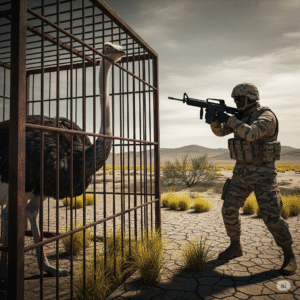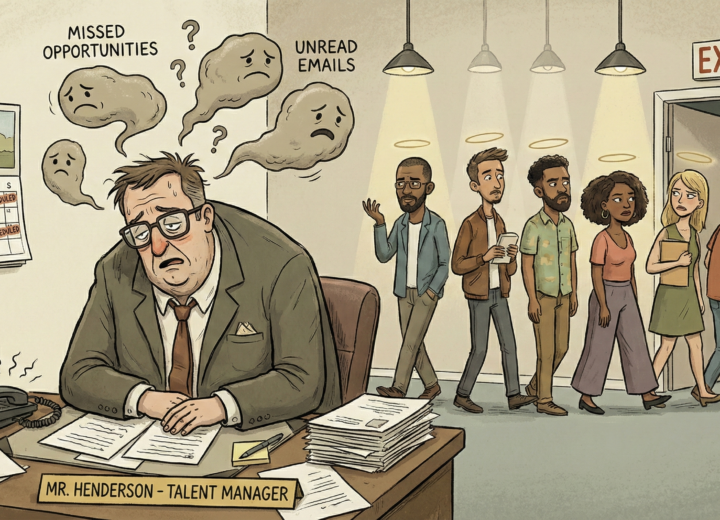NIGERIAN BUSINESS LEADERS THAT PLAY THE OSTRICH
In the Nigerian business landscape, leaders often play the ostrich—avoiding or ignoring serious conflicts, especially those involving relationships and ethics. This isn’t due to a lack of awareness but is a complex behavior rooted in cultural values, social dynamics, and a lack of formal training. Leaders often choose this path to preserve a facade of harmony, respect hierarchical structures, and avoid the perceived shame and disruption that open confrontation could cause.
How to Prevent and Correct Ostrich Leadership

Preventing and correcting this anomaly requires a deliberate and multi-faceted approach that addresses both the culture and the leadership skills within an organization.
Prevention: Building a Culture of Courage
- Foster Psychological Safety: Create an environment where employees feel safe to raise concerns without fear of reprisal. Leaders must explicitly state that constructive feedback and disagreement are welcome and essential for growth.
- Implement Formal Conflict Resolution Training: Equip all levels of leadership with the skills to address conflict head-on. This includes training in non-violent communication, active listening, and mediation techniques.
- Establish a Code of Conduct: Clearly define acceptable behavior and ethical standards. This provides a formal framework for addressing issues, removing the ambiguity that often leads to avoidance.
- Promote an “Open-Door” Policy (with Action): A leader’s door should not just be physically open, but psychologically open. Leaders must actively listen to concerns and demonstrate that they will take appropriate action, even on difficult issues.
Correction: Healing the Wounds

- Acknowledge the Elephant in the Room: The first step is for a leader to openly admit that a problem has been ignored. This vulnerable act can begin to rebuild trust.
- Bring in a Third-Party Mediator: For entrenched conflicts, an impartial mediator (either internal or external) can facilitate a safe and structured conversation, ensuring all parties are heard and a resolution is reached.
- Create an Action Plan: Once the conflict is on the table, work with the team to develop a clear, documented plan to resolve the issue and prevent its recurrence. This demonstrates a commitment to change.
Global Problem, Local Manifestation
This is not solely a Nigerian or African problem. The tendency to avoid conflict is a universal human trait driven by the fear of being disliked, a lack of communication skills, or an aversion to discomfort.
However, the specific causes and manifestations are culturally unique. In highly hierarchical Asian cultures, for example, a leader might avoid conflict to preserve “face” and maintain a respectful image. In some Western cultures, the avoidance might stem from a desire to be seen as “nice” or “easy-going.” The core behavior is the same, but the social pressures that drive it are different.
Is It All Bad? When Can It Be Put to Good Use?
Generally, playing the ostrich is all bad. It allows small issues to fester into major crises, erodes trust, and prevents an organization from reaching its full potential.
There are, however, extremely rare and specific situations where a leader might temporarily defer a minor issue. For instance, a leader might choose to ignore a small, non-critical disagreement between two employees for a few days to focus all resources on an urgent, company-ending crisis. This is a highly risky, temporary strategy, not a sustainable leadership style. A true leader would still have a plan to address the minor issue once the immediate crisis is over.
The Path to a Complete Reset

It is impossible to completely eliminate this issue, as it is a human behavioral tendency. However, an organization can be “reset” to significantly reduce its occurrence by:
- Auditing the Culture: Acknowledge that the organization has a problem with conflict avoidance. Conduct surveys and interviews to understand the root causes.
- Leadership Change: A new leadership team committed to radical transparency and open communication may be necessary to signal a new era.
- Building a Values-Driven Organization: Embed values like candor, courage, and accountability into the company’s mission statement, performance reviews, and daily operations.
- Overhauling Systems and Processes: Redesign performance management systems to include feedback on a leader’s ability to handle conflict. Create formal channels for reporting issues and ensure they are acted upon swiftly and fairly.
The Final Verdict: Is It Enough to Bring Down an Organization?
Yes, it is absolutely enough to bring down an organization. Ignoring a toxic culture, unethical relationships, or a growing market threat can lead to:
- Mass Exodus of Talent: Top performers will leave an organization where problems are not addressed.
- Reputational Damage: Unethical behavior that is ignored will eventually leak out, destroying the company’s brand and customer trust.
- Operational Failure: Unresolved conflicts can lead to project delays, poor quality work, and a breakdown of communication, ultimately leading to business failure.
The issue is common in both for-profit and not-for-profit organizations. While the causes and solutions share core principles (e.g., communication, trust), their application will differ. A not-for-profit might face a conflict about its mission’s direction, while a for-profit might argue over profit-sharing. The underlying need for a courageous leader remains the same.





